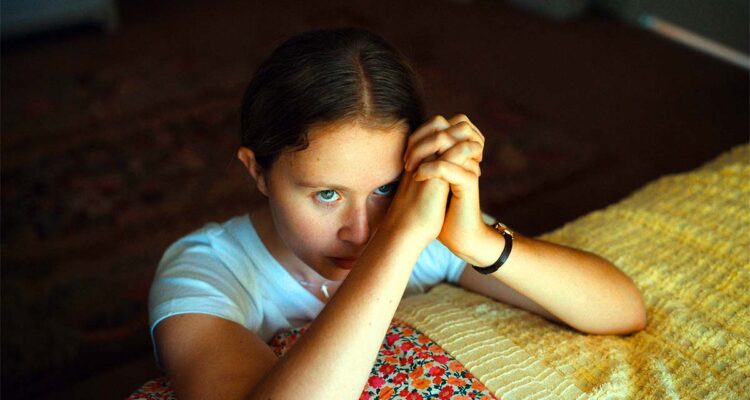Movie Info
Movie Info
- Director
- Laurel Parmet
- Run Time
- 1 hour and 57 minutes
- Rating
- R
VP Content Ratings
- Violence
- 1/10
- Language
- 3/10
- Sex & Nudity
- 5/10
- Star Rating
Relevant Quotes
They heard the sound of the Lord God walking in the garden at the time of the evening breeze, and the man and his wife hid themselves from the presence of the Lord God among the trees of the garden. But the Lord God called to the man and said to him, “Where are you?” He said, “I heard the sound of you in the garden, and I was afraid, because I was naked, and I hid myself.” He said, “Who told you that you were naked? Have you eaten from the tree of which I commanded you not to eat?” The man said, “The woman whom you gave to be with me, she gave me fruit from the tree, and I ate.”

Writer and director Laurel Parmet explores faith, paternalism, and sex in this tale set in a fundamentalist Christian community in rural Kentucky. Shown from the perspective of a 17-year-old girl striving to express herself in the midst of a community designed to repress her femininity, it should linger long in your memory.
We first hear the voice of Jem Starling (Eliza Scanlen) for a few moments before we see her. She prays, “I hope to glorify you with all I do. Let it not be me that they see; let it be you.” She is referring to the liturgical dance that her troupe will be performing in church. (It is a bit curious, in that I remember back in the Sixties when dance was being re-introduced into worship, and many conservatives resisted it, considering dance as too “sensual” to welcome into the bosom of the church. Somehow, Jem’s church elders have agreed to accept it. However, after skillfully leading the group, Jem is called out by an older woman who shames her because the outline of her bra can be seen beneath her white robe. The girl runs off to cry by herself.
As the story progresses Jan is continually criticized by the older women as using dance to call attention to herself. At the end of one routine, the other girls kneel, leaving Jem standing at the center alone. She is criticized for this and forced to change the choreography so that all are kneeling. Jem, of course, is a teenager craving recognition, so there is an element of truth in the charge against her. She does crave attention, but sadly, there is no trace of understanding or compassion in the spiteful criticisms inflicted on her. The scene in which the judgmental woman forces her to redo her choreography is painful to watch.
Jem is part of a large family, with her mother Heidi (Wrenn Schmidt) expecting her to take up the slack in caring for her younger siblings due to her father Paul’s (Jimmi Simpson) drinking problem. She will learn that he too feels constrained because he gave up his place in a rock band known as The Deadbeats long ago in order to marry her mother. His love of music has emerged in her as a talent for choreography. But he has suppressed his past and his longings in favor of his wife’s beliefs, even consenting to arranging for the courting of Jem by Ben (Austin Abrams), the youngest son of Pastor Taylor (Kyle Secor). Jem has no feelings for the taciturn boy, but supposedly the two will develop them and eventually marry.
However, Jem is already drawn to the church’s youth pastor Owen, the married son of Pastor Taylor. And we see that he too, longing for more, is attracted by her. Owen is several years older, but apparently sees in the creative girl something lacking in his marriage. (I write “apparent” because we do not see anything of his family life.) To justify his first kiss and subsequent sexual contacts, carried out in his car at secluded places, Owen resorts to the rationale used by virtually all religious leaders who commit adultery—God’s will. “God must want us to be together.” It is enough for Jem, too, who enters into a series of deceptions, sneaking out at night for rendezvous. By now she has quit the dance troupe, with the other girls, jealous of her leadership, happy over the change. Jem still attends worship and midweek church events, but feels increasingly isolated from everyone but her lover.
Jem’s life centers now on Owen and their stolen time together. When her younger sister spots her sneaking back from a tryst, she makes the girl promise not to tell anyone. Jem does report this to Owen. As he begins to have qualms about their relationship—or rather, about the exposure of it—and she suggests that maybe they should come out to the congregation themselves, matters come to a head, complete with Pastor Taylor bringing the girl before the congregation to confess her sin and offer repentance. Shades of The Scarlet Letter, as there is no similar humiliation of Owen, who actually had taken the first step down the road of betrayal of his wedding vows!
This church scene led me to think of the passage in Genesis 3 wherein God accuses Adam and Eve of violating his commandment concerning the forbidden fruit, and good ole Adam tries to pass the blame to his wife—which influenced theologians ever after to blame Woman for the Fall.
I was also intrigued by writer Parmet’s depiction of Jem’s talent of choreography and how it fits into the culmination of the plot. Dance employs the body to express truth and beauty, and thus has often been regarded by Christians, suspicious that it is the sensual that leads to the corruption of the spirit, with caution and anxiety. Thus, the older woman’s harsh criticism of Jem.
For the open-minded dance has been symbolic of freedom and joy, as we see in one of my favorite folk hymns, “Lord of the Dance.” In this hymn Jesus is the Lord of the Dance who dances on in spite of criticism, persecution, and death. A similar message is conveyed in my favorite sequence from Charles Shultz’s comic strip “Peanuts.” Snoopy is depicted as dancing in the face of the cries of Lucy (the cartoon’s counterpart of the older woman in this film). She yells “FLOODS, FIRE, AND FAMINE.” The smiling little pooch keeps dancing, then she yells, “DOOM, DEFEAT AND DESPAIR!” He is dancing still, so she gives up, “I guess it is no use. ‘Sigh,’” and in the last panel, with the canine Zorba still dancing, “Nothing seems to disturb him.” (I could go on to expound upon the great film Zorba the Greek.)
Warning: slight spoiler follows.
It seems for a while that the Lucys in Jem’s life have won, especially when the girl makes a decision that is both rebellious against her constraining church, yet submissive to its paternalistic, imprisoning system. Until she reverses that decision. We don’t know what Jem’s future is—where she will go or what she will do. The open-ended conclusion only assures us that Jem the dancer is, in the words of a great apostle of freedom, “Free at last, Free at last, Thank God almighty (she) is free at last.”
This review will be in the June issue of VP along with a set of questions for reflection and/or discussion. If you have found reviews on this site helpful, please consider purchasing a subscription or individual issue in The Store.

